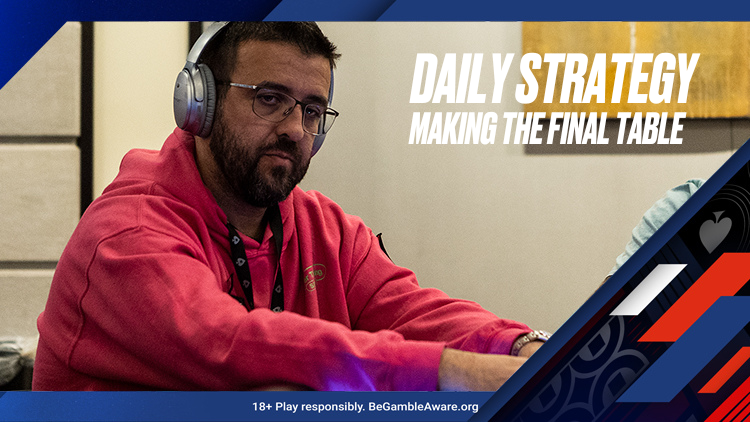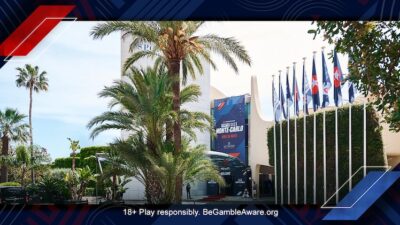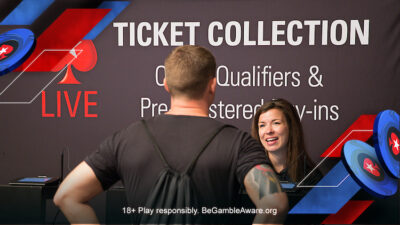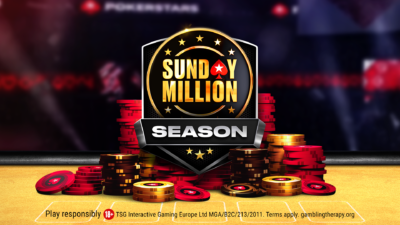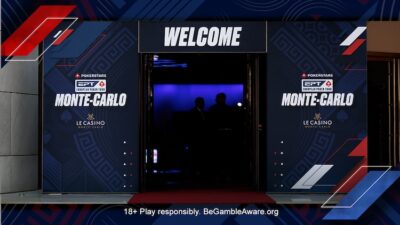In today’s Daily Strategy, the brilliant Brazilian Andre Akkari looks at the process of converting a deep run into a final table appearance.
On Friday and Saturday, players in the EPT Barcelona Main Event will have had one thing on their minds: reaching the final table. There were 60 of them, from a field of 2,294 entries, still involved at Friday lunchtime, but only eight will be left at the end of Saturday night.
This is a crucial stage of any poker tournament, and one the Team PokerStars Pro Andre Akkari knows well. He finished fifth here in Barcelona in 2017, and has of course made numerous other final tables, including at World Series events. He seemed like the best person to ask for his tips on how to make the push to the very deepest stages.
Don’t get too obsessed by reaching the final, because you might miss the things that matter right now
If you keep focusing on the final table only, you might not be focusing on what you have to focus on now. You have to focus hand by hand, on all the players on your table, what they are thinking. You have to assess how much all those people are thinking about the final table, how much they want to get there. Because then you can put some pressure on them, you can take advantage of them. I don’t think there is any goal other than to win the tournament. A final table is not a win. You need to try to win the max. You should be looking for opportunities at the table, if your opponents are focused on something else. They might be afraid to open a range they usually play, so you can take advantage of that. You can three-bet more, and they might fold big hands, even if you have something like jack-four suited, they might be folding pocket nines, pocket eights. This is a good opportunity for you. That’s what I try to do, and it’s been working.
If I’m the chip leader, I’m probably going to avoid the small stacks, because they’re going to be desperate to double up. But the medium stacks, I’m going to be trying to put a lot of pressure on them, especially the second place, the third place players at the table. Those are the ones who are going to fold more, so you have to take advantage of that. You can play in position against them. If there are players with eight big blinds or 10 big blinds, it’s not good to put pressure on them, because if they react, then you have to call. You’re priced in. You might have to call seven big blinds, eight big blinds with shitty hands and it’s not goo for you. But when you put some pressure on 15 big blinds, 17 big blinds, 18 big blinds, then it’s good for us. Because if you put pressure and they react, we can just fold.
If you’re the short stack…
Then you have to take advantage of the big stack. If they are opening a lot, if they are good and they’re trying to put pressure on, opening a wide range, then you can take advantage. Sometimes hands like king-eight, king-nine, queen-nine, queen-ten, these are hands that you can play against them with advantage. You have to take the initiative. You cannot be afraid. Sometimes you have king-ten off-suit and the chip leader opens, and you’re like, ‘Oh man.’ But king-ten plays amazing against the chip leader. You have to play it. Don’t be afraid.
Watch out for how your opponents are changing their games
There’s a curve, like on a graph, for how aggressive you can play. If you see that the table has suddenly become really passive, and everyone is just trying to hold on until the final table, you can put more pressure on them. It’s almost unbelievable how aggressive you can be here. You can open 60 percent of the hands. Then as you get to the final 30 or the final 20, you’re opening 50 percent. It’s usually not profitable to play like that, but in this kind of situation, it is. If people have given up, you have to play like that. The experienced players are doing that all the time.
Identify the players who are just hoping to ladder up
If you see some people suffering, struggling, wondering about pay-jumps, and things like that, you have to be aware of that. You can see who is looking at the TV screens all the time, looking at the payouts and the players left, what’s the next pay-jump. That’s going to change ranges. It’s going to change their ranges, and you need to adapt your ranges. But if you’re not focused, you might not be seeing that. When the deck is being shuffled, look for some information you can use to take advantage. I trust my guts; I’ll notice things and use that information. Obviously sometimes I make mistakes. It might be a fake tell. Sometimes things aren’t what you think. But most of the time it works. If you can make adjustments, it can help you get there, get to the final three, final one.
Don’t let over-caution ruin your once-in-a-lifetime opportunity
I don’t recommend just trying to edge to the next pay-jump. It’s so difficult to get to the final 30 or the final 40, and it’s almost impossible for a true amateur player to win a tournament like this, so if the universe gives you the chance, you have to try to take it. Don’t be happy to get 18th, or 22nd, it’s not a good story. You don’t want to tell your kids you got 23rd at EPT Barcelona one year. You are going to tell a good story if you got third or second or especially if you win. So if you have the chance to get there, fight for it. Don’t be afraid. Don’t give up.
Be unpredictable, and be aggressive
The the worst scenario for an experienced player is facing an amateur who is prepared to play back at them. If you have an amateur who is not afraid, who is firing bullets all the time, you say, ‘Fuck man!’ The experienced players will be trying to take advantage and they will end up trying to get cute. The experienced players will try to get cute. They will be thinking you should be folding all the time, but you can make it hard for them. They open, you shove. They open, you shove. If I was facing this kind of player, I’d be thinking, ‘Jesus Christ! I know he doesn’t have a hand every time, but neither do I, so I can’t do anything.’ That’s the kind of reaction you want. I believe that’s profitable. But most recreational players wouldn’t do that. They’d run away.
Your chances of landing on the feature table now go up. And that’s a good thing
If you’re heading to the feature table for the first time, you take everything I have just said, and do it even more intensely. The TV table makes the experienced player show off more. They want to show what they know about poker. They want to play more. They want to steal blinds. If you’re an amateur player, you can take advantage of this even more. You know that they’re going to do it. But sometimes, even if you know it, you don’t react. You think, ‘OK, I’ll wait. Maybe the next hand I’ll get ace-queen.’ You’re not going to get it. It’s not coming. You have to take the advantage that’s sitting in front of you. The feature table in my opinion, is a huge opportunity for amateur players. If I’m there — i.e., an experienced player — probably I’m going to change my game a little bit. I’m going to be more aggressive, because I believe an amateur player is going to be more afraid. But if you think exactly the opposite, you’re going to be able to take advantage.


